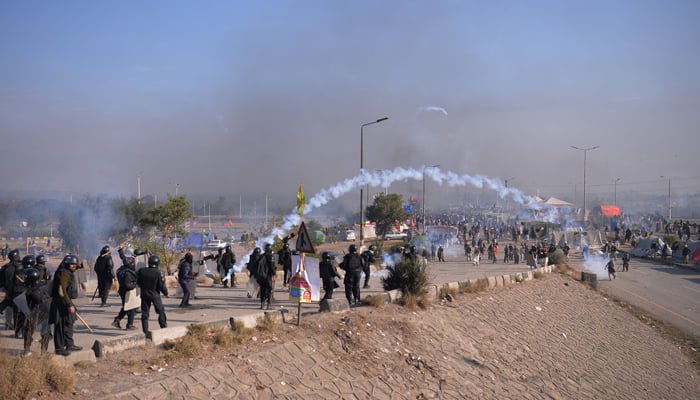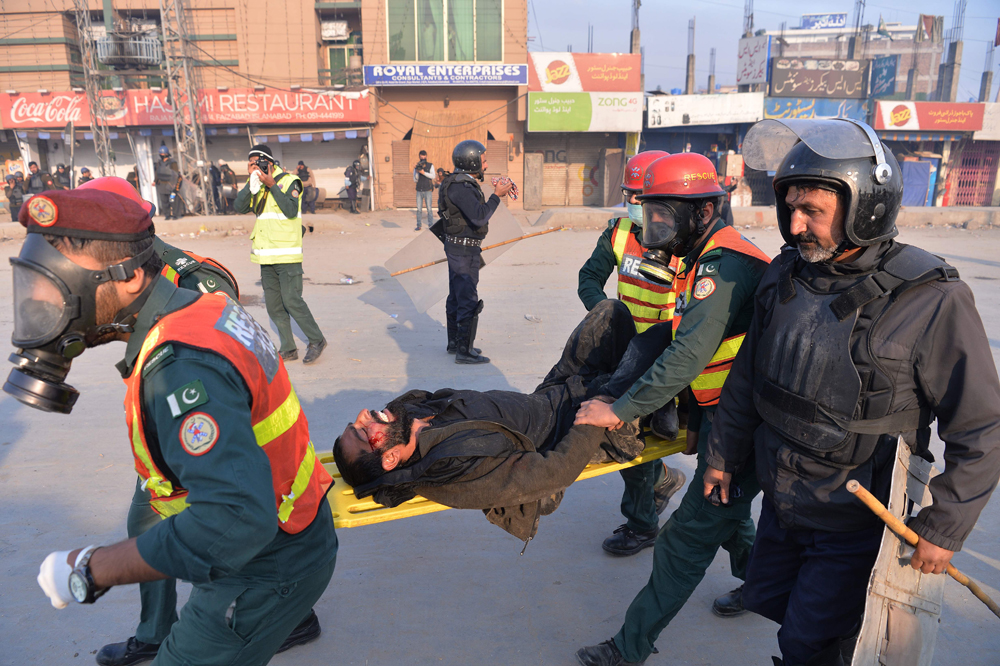Islamabad dharna: Military seeks answers to key questions before troop deployment
The army would be deployed for an indefinite period to maintain peace in Islamabad, according to a notification issued by the Interior Ministry after an approval from Prime Minister Shahid Khaqan Abbasi.
The Pakistan Army is prepared to assist the government to cope with the situation arising out of a police crackdown against protesters in Islamabad, but the military leadership has sought answers to some key questions before deployment of troops.
In its response to government's request the army said: "The troops are "fully ready to perform the assigned task in line with its institutional obligations", there are "few aspects meriting deliberation prior to [the deployment".
The police force "has not been optimally utilized to its full capability" in "dealing with [the] protesters", the Army noted.
In addition, "Pakistan Rangers, backing […] police as 2nd tier force physically deployed with police in Islamabad, have not been given written instructions as agreed for their employment."
The Army added that its troops are "traditionally not just used for dispersal of crowd/protesters but to quell commotion".
Therefore, their deployment "needs to be clarified in the context of item 6 of Supreme Court judgment dated November 23, 2017, with regards to civil petition no 2983 of 2016 (Sher Jamal and others vs Wali Sardar and others)".
Also, the Islamabad High Court (IHC) "restrains [the] use of 'firearms' during clearance operation", as per Item 8 of its "judgment of writ petition number 3914 of 2017".

The government on Saturday called out the army after clashes broke out in the twin cities of Islamabad and Rawalpindi and other major cities of the country when police and paramilitary forces cracked down on protesters from Tehreek Labaik Pakistan (TLP) who were blocking the Faizabad Interchange.
The army would be deployed for an indefinite period to maintain peace in Islamabad, according to a notification issued by the Interior Ministry after an approval from Prime Minister Shahid Khaqan Abbasi.
The statement of Ministry of Interior read: "...is pleased to authorize deployment of sufficient number of troops of Pakistan Army to be determined by the Commander 111 Brigade, in aid of civil power, to control law and order situation in Islamabad Capital Territory with effect from November 25 till further orders".

The government used its powers under Article 245 of the Constitution to call in the army in aid of the civil administration.
Earlier in the day, seven people were killed and over 200 people, including police officers, were injured as forces moved to disperse a sit-in that had virtually paralysed the country´s capital for weeks.
Smoke and tear gas filled the air as the roughly 8,500 elite police and paramilitary troops in riot gear were also seen throwing rocks and using slingshots in the ongoing bid to clear 2,000 or so hardline demonstrators which began soon after dawn.
Four dead bodies were brought to District Headquarters Hospital, Rawalpindi, while Holy Family Hospital and Benazir Bhutto Hospital received one body each. One person was killed in Hafizabad district of Punjab. The three bodies were bullet riddled, one was with a dagger injury, while post-mortem on two could not be conducted. However, police sources strictly denied use of any lethal weapon, including bullet guns.
The battle between the law enforcement agencies and the sit-in protesters started around 7:50 am.
The charged officials of police, Frontier Constabulary and Rangers, chanting full-throat slogans of Allah-ho-Akbar marched towards Faizabad Flyover which had been occupied by the protesters for 20 days. But, the protesters showing stiff resistance pushed back the police. The police started firing teargas shells which compelled the protesters to go back.
All kinds of traffic was suspended during operation in Faizabad area.
The local administration ordered immediate clousre of all schools along the Murree Road. The school managements immediately sent students to their homes due to the operation. The protesters also damaged government properties.
However the crackdown was 'suspended' in the evening as the protesters took over the streets in the federal capital and it became difficult for the forces to control the situation. The atmosphere continued to remain tense even late in the night.
The security forces could not arrest the sit-in leadership including Khadim Hussain Rizvi till late night. The protesters have surrounded leadership and have prevented police and Rangers from nearing the leadership.
There are prison vans and ambulances deployed at the site. Helicopters and drones are being used by the authorities for aerial surveillance. Police have also used water cannons to disperse the protesters.
-
Security forces gun down 30 terrorists in multiple IBOs in KP: ISPR
-
MQM-P calls for new province in Sindh
-
US report validates Pakistan military edge over India: PM
-
Banned TTP poses serious threat to Pakistan security: UNSC panel
-
CM Afridi clarifies remarks on by-poll after ECP requests army deployment
-
Dubai sees 3.2m Pakistani passengers in 2025 as airport sets new milestone
-
Security forces kill 23 Indian proxy terrorists in KP's Kurram
-
Pakistan to construct island to boost oil exploration: report











